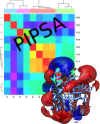Changes in webPIPSA
Version history
Version history for PIPSA (underlying tool),
webPIPSA (http://pipsa.h-its.org)
and multipipsa (python wrapper for the underlying tool).
webPIPSA is a standalone server, with an additional workflow to upload and
analyze structures directly.
From 2019 to 2023
- Changes are done in multipipisa, the python wrapper for pipsa.
This enables the use of pipsa within jupyter notebooks (see versions 4.0.2. to 4.0.12 multipipsa downloads)
Spring 2019
- Added multipipsa 4.0.2, a python wrapper to launch PIPSA code.
April 2014
- Due to problems with crashing pulchra, the pulchra tool was removed again.
If you need to complete missing atoms or residues on your structure, please run the pulchra or other tools before.
April 2014
- Version 1.5
- Modified the apbs launch script to always use the same grid spacing (1.0) as in uhbd calculations. Before the apbs grid spacing was depending on the protein size. Also the protein dielectric is set from 1 to 2, as in uhbd calculations.
- Added the tool pulchra version 304 (from center of systems biology in Atlanta) to allow reconstruction of missing residues. Before pdb2pqr could fail for some pdb structures. The commandline to invoke pulchra is pulchra304 -s -o -u 0 -v pdbstructure.pdb
February 2013
- Version 1.4
- Updated apbs version to apbs 1.4
- Updated pdb2pqr version to pdb2pqr 1.8
- Installed on a more powerfull server with more memory and disk space
- Executables recompiled on 64bit architecture
December 2010
- Version 1.3
- Integrated plot showing the distribution of Km values for different species
(provided by Stefan Henrich).
- STAMP aligment of templates given for an improved template selection.
- Improved access to Sabio (different database system) and BRENDA (more links to Uniprot entries included).
- Renaming of EML Research gGmbH to HITS gGmbH.
- Usage of several grid dimensions, to allow larger proteins to be process sucessfully.
February 2010
- Version 1.2
- Final build installed on Feb. 26th.
- Problems in the regression tutorial corrected
- Adaptions to be able to run the webserver on a live CD. This can be used
for training on remote sites with slow internet connections.
Spring 2009
- Version 1.1
- Possibility to upload PQR files on webPIPSA.
- Multiple templates can be selected to mimic protein flexibility.
- Heatmap result can be adjusted to either use the scale of values or fixed scale of possible values.
- Demonstration/tutuorial on how to perform a regression analysis of kinetic constants is given.
Fall 2007/Spring 2008
Initial release within sycamore (2007) and webPIPSA (2008):
- Version 1.0
- Additional modeller versions can be selected.
- webPIPSA started with an additional workflow to analyze user provided structures.
- Added a tutorial on the sycamore server.
- Region selection based on the swissprot features or PDB coordinates available.
- Clustering and heatmap on the results page.
Beta release within sycamore 2006/2007

